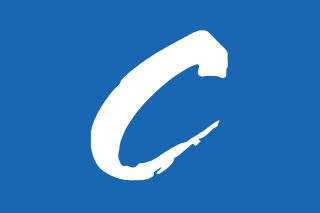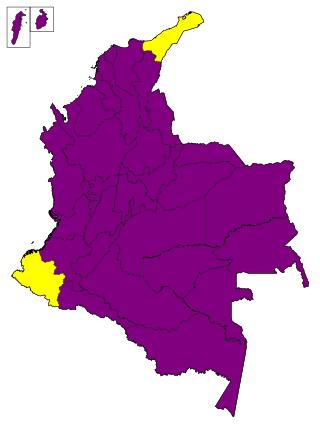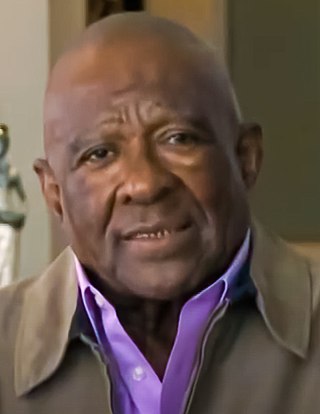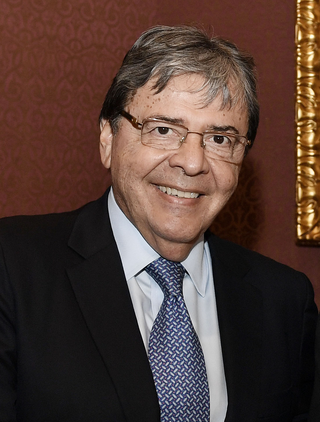Related Research Articles

The history of Colombia includes its settlement by indigenous peoples and the establishment of agrarian societies, notably the Muisca Confederation, Quimbaya Civilization, and Tairona Chiefdoms. The Spanish arrived in 1499 and initiated a period of annexation and colonization, ultimately creating the Viceroyalty of New Granada, with its capital at Bogotá. Independence from Spain was won in 1819, but by 1830 the resulting "Gran Colombia" Federation was dissolved. What is now Colombia and Panama emerged as the Republic of New Granada. The new nation experimented with federalism as the Granadine Confederation (1858) and then the United States of Colombia (1863) before the Republic of Colombia was finally declared in 1886. A period of constant political violence ensued, and Panama seceded in 1903. Since the 1960s, the country has suffered from an asymmetric low-intensity armed conflict which escalated in the 1990s but decreased from 2005 onward. The legacy of Colombia's history has resulted in a rich cultural heritage, and Colombia's geographic and climatic variations have contributed to the development of strong regional identities.

The Colombian Liberal Party is a centre to centre-left political party in Colombia. It was founded as a classical liberal party but later developed a more social-democratic tradition, joining the Socialist International in 1999.

Andrés Pastrana Arango is a Colombian politician who was the 30th President of Colombia from 1998 to 2002, following in the footsteps of his father, Misael Pastrana Borrero, who was president from 1970 to 1974.

The Colombian Conservative Party is a conservative political party in Colombia. The party was formally established in 1849 by Mariano Ospina Rodríguez and José Eusebio Caro.

Radical Change is a conservative liberal political party in Colombia.

Presidential elections were held in Colombia on 28 May 2006. Álvaro Uribe was re-elected as President for another four-year term, starting on 7 August 2006. Uribe obtained 62.35% of the vote, surpassing the 50% needed to avoid a runoff against the second-placed candidate.

Horacio Serpa Uribe was a Colombian lawyer, politician and Senator. Serpa ran as the Colombian Liberal Party candidate for President on three occasions; in 1998, 2002, and 2006. He previously served as congressman for Santander as Senator, Inspector General of Colombia, president of the National Constituent Assembly, Minister of the Interior, and as Ambassador to the Organization of American States. He was also involved in the 8000 process scandal in which money from the Cali Cartel entered the presidential campaign of Liberal candidate Ernesto Samper. In 2007 Serpa ran for the governorship of Santander Department and was elected on 28 October in the regional elections.

Marta Noemí del Espíritu Santo Sanín Posada is a Colombian-born politician and diplomat. She was the Conservative party candidate in the 2010 Colombian presidential election.
The FARC-Government peace process (1999–2002), from January 7, 1999, to February 20, 2002, was a failed peace process between the Government of President Andrés Pastrana Arango and the Revolutionary Armed Forces of Colombia (FARC) guerrilla group in an effort to bring to an end the ongoing Colombian armed conflict.
The 8,000 Process is the unofficial name of the legal investigation for the events surrounding accusations about the Colombian Liberal Party candidate Ernesto Samper's 1994 campaign for President of Colombia being partially funded with drug money. 8,000 Process was the case number issued by the Prosecutor General's Office.

Presidential elections were held in Colombia on 26 May 2002. Álvaro Uribe, the candidate of the recently created Colombia First movement, was elected, receiving 53% of the vote by the first round. Uribe took office on 7 August.

Humberto de la Calle Lombana is a Colombian lawyer and politician. He served as Vice President of Colombia from 1994 to 1997. De La Calle served in the cabinet as Interior Minister under two Presidents, Andrés Pastrana and César Gaviria. He also served as Ambassador to Spain and the United Kingdom. After 2003, De La Calle worked at his own Law firm which specialises in advising and representing international clients in Colombia. In October 2012 he was appointed by President Juan Manuel Santos as the chief negotiator in the peace process with the FARC.
National Front was a period in the history of Colombia in which the two main political parties, the Liberal Party and the Conservative Party, agreed to rotate power, intercalating for a period of four presidential terms. The National Front Presidents were Alberto Lleras Camargo (Liberal), Guillermo León Valencia (Conservative), Carlos Lleras Restrepo (Liberal), and Misael Pastrana Borrero (Conservative).
Harold Bedoya Pizarro was a general and commander of the Colombian National Army. Bedoya also ran for President of Colombia in the 1998 and 2002 elections.

Édgar José Perea Arias was a Colombian politician and football radio and television commentator. In a country where soccer is the national pastime, Perea was considered one of Colombia's greatest sportscasters. He was known in Colombia for his thunderous voice and for the way he intoned the traditional Spanish-style "Goooooooool!" sound when a goal had been scored. Perea commentated on eight football World Cups, fifteen World Series for CBS Spanish Radio, seven Olympics, many boxing matches and thousands of soccer matches in Colombia and abroad. He became so successful as a sportscaster that he transcended himself into a national politician. Perea was Afro-Colombian and broke down many barriers that kept black Colombians from gaining admiration and respect in Colombian pop culture and in entering the ritzy social scenes of Colombian society. After gaining popularity for his picturesque way of narrating football matches, Perea joined the Colombian Liberal Party with the support of then presidential candidate Horacio Serpa and ran for the senate. In 2009 he was appointed Ambassador to Colombia in South Africa.

Germán Vargas Lleras is a Colombian politician who recently served as Vice President of Colombia under President Juan Manuel Santos Calderón. A member of the Radical Change political party, he served four consecutive terms in the Senate, having been elected in 1994. German Vargas also served in the Cabinet as the Minister of Interior and then as the Minister of Housing, City and Territory. He was elected Vice President of Colombia in 2014, running alongside Juan Manuel Santos who was seeking re-election for a second term as president. On 15 March 2017, Vargas Lleras resigned as vice president in order to be eligible to run for president in the 2018 presidential elections. He finished in fourth place.

General elections were held in Colombia on 19 April 1970 to elect the president, the Senate and the Chamber of Representatives. It was the first time all three institutions had been elected on the same day, and was also the last election under the National Front agreement, which had restricted electoral participation to the Conservative Party and the Liberal Party, with each party allocated 50% of the seats in both houses, whilst the presidency alternated between the two parties. As a result, the main contest in parliamentary elections was between factions within each party, whilst only Conservative candidates ran for the presidency. The result was a victory for Misael Pastrana Borrero, who received 40.7% of the vote. However, supporters of Gustavo Rojas Pinilla claimed that the election had been rigged in favour of Pastrana. Rojas had also been supported by the Christian Social Democratic Party. The 19th of April Movement guerrillas traced their origins to this alleged fraud.

Presidential elections were held in Colombia on 27 May 2018. As no candidate received a majority of the vote, the second round of voting was held on 17 June. Incumbent president Juan Manuel Santos was ineligible to seek a third term. Iván Duque, a senator, defeated Gustavo Petro, former mayor of Bogotá, in the second round. Duque's victory made him one of the youngest individuals elected to the presidency, aged 42. His running mate, Marta Lucía Ramírez, was the first woman elected to the vice presidency in Colombian history.

Carlos Holmes Trujillo García was a Colombian dynasty politician, diplomat, scholar, and attorney who served as minister of defense, foreign affairs, interior, and education. He also served as the mayor of Cali and as ambassador to the Organization of American States (OAS), the European Union, and a number of nations.

Álvaro Leyva Durán is a Colombian lawyer, economist, politician, human rights defender and diplomat. He has been the Minister of Foreign Affairs for Colombia in the government of Gustavo Petro since 7 August 2022. On 7 February 2024, he was suspended from his ministerial position for three months over an investigation into potential violations of procurement laws.